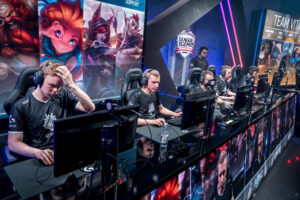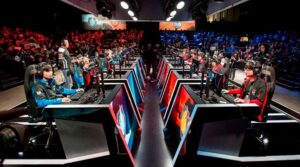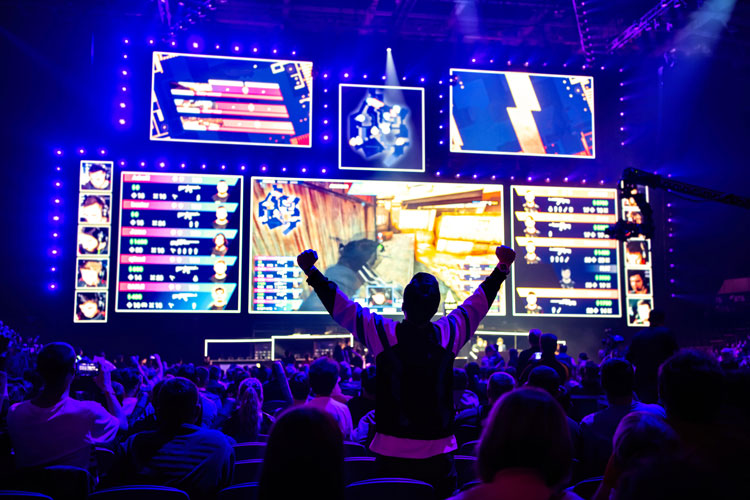In the not-so-distant past, competitive gaming was a niche subculture, existing on the fringes of mainstream entertainment. Gamers gather in dimly lit arcades, fueled by a passion for titles like Pac-Man and Space Invaders. This era laid the groundwork for what would eventually become the global phenomenon we now know as esports. As technology advanced, so did the complexity and allure of video games, setting the stage for the evolution of competitive gaming. Much like esports teams refine their strategies for optimal outcomes, CRO design services meticulously optimize websites to achieve desired results.
Esports emerged organically, with local tournaments and friendly competitions evolving into larger-scale events. The birth of online multiplayer games provided a virtual arena for players worldwide to showcase their skills. The grassroots nature of early esports fostered a sense of community among gamers, laying the foundation for the cultural shift that would propel competitive gaming into the mainstream.
As technology continued to advance, so did the production value of esports events. The transition from small-scale local gatherings to professionally organized tournaments marked a pivotal moment. Streaming platforms like Twitch allow fans to connect with their favorite players in real time, transcending geographical barriers. Esports had officially outgrown its niche origins, captivating a global audience and setting the stage for unprecedented growth.
Technological Advancements: Catalyst for Growth

The rapid evolution of technology has been a driving force behind the meteoric rise of esports. High-speed internet, powerful gaming consoles, and cutting-edge PC hardware have elevated the gaming experience to new heights. Esports titles, once limited by the constraints of early technology, now boast stunning graphics, immersive gameplay, and intricate storylines that rival traditional forms of entertainment.
Did you know that every esports game has a state-of-the-art website thanks to the best web hosting?
Live streaming platforms became the backbone of esports spectatorship, allowing millions to tune in and witness competitions in real time. The marriage of technology and esports not only enhanced the viewer experience but also provided a platform for aspiring gamers to showcase their talent. With social media amplifying the reach of these events, esports became a cultural phenomenon, breaking free from the confines of the gaming community and captivating a broader audience.
The integration of virtual reality (VR) and augmented reality (AR) further blurred the lines between the digital and physical worlds. Esports events embraced these technologies, offering viewers an unprecedented level of immersion. The evolution of gaming peripherals, from high-performance controllers to virtual reality headsets, has brought a tangible aspect to the virtual realm of esports, captivating both players and spectators alike. VR sets are really expensive and if you need a loan to invest in one you can contact one of the companies that offer loan origination software for private money lenders.
The Rise of Esports Celebrities
As esports gained mainstream recognition, individual players began to transcend the boundaries of their gaming screens, evolving into bona fide celebrities. The rise of esports influencers on platforms like YouTube and Instagram created a new breed of stars, garnering millions of followers and sponsorships. These personalities not only showcased their gaming prowess but also offered insights into their lives, creating a connection with fans that extended beyond the gaming arena.
Esports celebrities became ambassadors for the industry, breaking stereotypes and challenging misconceptions about gaming culture. The allure of a career in professional gaming grew, with aspiring players inspired by the success stories of their favorite esports idols. This shift in perception further fueled the growth of esports, attracting investment, corporate sponsorships, and mainstream media attention. Many businessmen use value enhancement services to improve their esports businesses.
The transition from underground competitions to sold-out arenas mirrored the ascent of esports celebrities. The allure of watching top-tier players compete on a global stage drew massive crowds, with events selling out iconic venues like Madison Square Garden. The newfound fame of esports celebrities contributed to the industry’s legitimacy, solidifying its status as a global entertainment powerhouse. Many esports celebrities use a Denver limo to drive to tournaments.
Challenges and Controversies
Despite its remarkable growth, esports has not been immune to challenges and controversies. Issues such as doping scandals, match-fixing allegations, and disputes over player contracts have highlighted the complexities of the industry. The rapid influx of money and corporate interest has brought both opportunities and pitfalls, testing the resilience of the esports ecosystem.
Esports venues need to have proper HVAC and if you have problems with that you can contact a company that works on HVAC in Charlotte NC.
Diversity and inclusion have also emerged as critical concerns within the esports community. While the industry has made strides in addressing gender and racial disparities, there is still work to be done to ensure equal opportunities for all. The competitive nature of esports can sometimes foster toxic behavior, prompting organizations to implement measures to create a more inclusive and respectful environment for players and fans alike.
Navigating the regulatory landscape has proven challenging as esports continues to mature. Establishing standardized rules, addressing player rights, and creating a sustainable ecosystem are ongoing endeavors. As esports grapples with these challenges, it simultaneously evolves, demonstrating its resilience and adaptability in the face of adversity.
Emergence of Esports Academies
As esports solidifies its position in mainstream culture, a new development is shaping the landscape: the rise of esports academies. These specialized institutions focus on nurturing talent from a young age, providing structured training programs, and combining academics with professional gaming. The concept of esports scholarships is gaining traction, offering students the opportunity to pursue education while honing their gaming skills in a supportive environment. These academies often work with a renowned Event Emcee.
Esports academies serve as incubators for future stars, emphasizing not only skill development but also the importance of teamwork, communication, and sportsmanship. This evolution mirrors traditional sports development systems, fostering a pipeline of talent that ensures the sustainability and competitiveness of the esports ecosystem. The integration of academia and gaming underscores the multidimensional nature of esports as both a career and an educational pursuit.
If you are looking to create a gaming room in your home you can contact contractors in Oakland to help you with remodeling.
Global Esports Leagues: A Unified Front
The future of esports lies in the establishment of global leagues that transcend regional boundaries. While regional competitions have been instrumental in the growth of esports, the next phase involves creating a cohesive structure that culminates in a truly global championship. This shift aligns with the increasing globalization of esports teams and players, fostering a sense of international camaraderie and competition.
If you are playing video games in your room you can buy blinds in Colorado Springs to make it darker. Your experience will be much better.
A global league system would not only elevate the level of competition but also provide a platform for diverse cultures and playstyles to converge. The prospect of witnessing teams from different continents battling for supremacy adds a new layer of excitement to the esports narrative. This global unity reflects the evolution of esports from a fragmented subculture to a harmonized and truly global phenomenon.
Serbia organizes a lot of esports tournaments and you can drive around the country by renting a vehicle from rent a car Beograd.
Technological Innovations: Beyond the Screen

As technology continues to advance, the integration of esports into everyday life is becoming more pronounced. Virtual Reality (VR) and Augmented Reality (AR) are no longer limited to enhancing the gaming experience; they are extending into physical spaces. Esports-themed amusement parks and dedicated arenas equipped with state-of-the-art technology offer fans immersive experiences beyond the confines of traditional gaming setups.
The concept of mixed-reality esports events, where physical and digital elements seamlessly merge, is gaining popularity. Imagine attending an esports tournament where holographic projections of players appear on stage, blurring the lines between the virtual and the real. Technological innovations are not only enhancing the viewing experience but also redefining how esports events are conceptualized and executed.
If you want to buy a venue where you can organize esports tournaments you should contact a mortgage company in Raleigh NC.
Esports and Mental Health Advocacy
The intense nature of competitive gaming has brought mental health into focus within the esports community. Recognizing the unique pressures and challenges faced by professional players, organizations are increasingly investing in mental health resources. Esports teams now have dedicated psychologists and wellness coaches, emphasizing the importance of mental resilience and well-being.
If you want to take your time off from gaming fishing is a great hobby! Be sure to check a fishing forecast before embarking on your trip.
Public discussions around the mental health of esports professionals are helping destigmatize mental health issues. Players openly sharing their experiences with burnout, anxiety, and stress contribute to a more empathetic and supportive community. As esports continues to mature, mental health advocacy becomes a crucial component, ensuring that players can thrive both inside and outside the gaming arena.
Be sure to do a water heater replacement if your water heater is broken because hot water could really help you relax and regain focus after a long gaming session.
The Intersection of Esports and Education
Beyond esports academies, the intersection of esports and traditional education is becoming more pronounced. Educational institutions are recognizing the value of esports as a viable career path and are incorporating gaming-related programs into their curriculum. Esports management, game design, and sports science with a focus on gaming are emerging fields, providing students with academic avenues that align with their passion for gaming.
Esports tournaments and leagues at the collegiate level are also gaining prominence. Universities are forming official esports teams, competing in organized leagues, and offering scholarships to talented players. This integration of esports into education not only legitimizes the industry but also provides diverse career opportunities beyond professional gaming. The Esports industry also has a lot of promotional products.
Sustainability and Environmental Responsibility
As esports events grow in scale and popularity, so does the environmental impact. The energy consumption of high-performance gaming equipment and the logistics of hosting large-scale tournaments contribute to carbon footprints. The next frontier for esports involves addressing these environmental concerns and adopting sustainable practices.
Esports organizations are increasingly recognizing their responsibility to implement eco-friendly initiatives. From utilizing renewable energy sources to offsetting carbon emissions, the industry is actively exploring ways to minimize its environmental footprint. The drive for sustainability aligns esports with broader global efforts to combat climate change and showcases the industry’s commitment to responsible growth.
The Esports venues need to be checked for pests and you can contact pest control in Reno for that.
Interactive Fan Engagement: The Future Viewing Experience
The future of esports viewing transcends passive spectatorship. Interactive fan engagement is taking center stage, with platforms experimenting with features that allow viewers to influence the outcome of in-game events or interact with players during live broadcasts. This level of engagement transforms esports from a one-way experience to a dynamic, participatory event.
Did you know that there is a theme park designer who creates unique theme parks based on famous video games like League of Legends?
Imagine a scenario where viewers, through virtual reality, can step into the shoes of their favorite players during a crucial moment in a match. Fan participation extends beyond social media interactions to real-time impact on the unfolding game. This evolution not only enhances the viewer experience but also blurs the boundaries between fans and players, creating a more immersive and personalized connection.
If you love video games you can hire a company that provides professional wallpaper installation to enrich your room with your favorite video game characters.
Esports in the Olympics: A Contested Frontier
The debate surrounding the inclusion of esports in the Olympic Games continues to unfold. While some argue that esports represents a new frontier in sports and should be embraced by the Olympics, others express reservations about whether competitive gaming aligns with traditional Olympic values. The discussion raises questions about what constitutes a sport in the 21st century and challenges long-held perceptions of athletic competition.
Esports’ potential inclusion in the Olympics highlights the industry’s quest for legitimacy and recognition on the world stage. Regardless of the outcome, the debate prompts a broader conversation about the evolving nature of sports and the cultural significance of esports in contemporary society.
Esports Diplomacy: Bridging Divides
Esports has the unique potential to transcend geopolitical boundaries, fostering connections and understanding in ways traditional diplomacy often struggles to achieve. International esports competitions bring together players from diverse backgrounds, creating a shared space where competition transcends national differences. The language of gaming becomes a universal medium, breaking down cultural barriers and building bridges between communities.
Esports diplomacy extends beyond the players to the fans, creating a global community that celebrates shared passions. The potential for diplomatic initiatives centered around esports events could become a powerful tool for soft diplomacy, fostering understanding and collaboration in an interconnected world.
Inclusive Virtual Worlds: A New Frontier for Representation
As the gaming industry continues to grapple with issues of diversity and inclusion, esports is emerging as a catalyst for change. The creation of inclusive virtual worlds within esports titles allows for diverse representation, challenging stereotypes and providing a platform for underrepresented groups. This evolution goes beyond gender and race, encompassing diverse abilities, sexual orientations, and cultural backgrounds.
Esports organizations are actively promoting inclusivity, both in player rosters and within the broader gaming community. The industry’s commitment to fostering a welcoming environment for all players contributes to a cultural shift that transcends the digital realm, influencing societal attitudes toward diversity and acceptance.
Esports and Artificial Intelligence: A Synergistic Future

The integration of artificial intelligence (AI) into esports is poised to revolutionize the landscape. AI-powered analytics can provide players and teams with unprecedented insights into their performance, allowing for strategic adjustments and skill refinement. Virtual opponents powered by advanced AI algorithms challenge players in ways that go beyond human capabilities, pushing the boundaries of competition.
Additionally, AI is playing a role in content creation and broadcasting. Automated camera systems, AI-driven commentary, and personalized viewer experiences based on individual preferences are reshaping how esports events are produced and consumed. The synergy between esports and AI represents a forward-looking collaboration that enhances both the competitive and entertainment aspects of the industry.
Conclusion: A Dynamic Tapestry of Possibilities
In traversing the evolution of esports from its humble beginnings to a multifaceted global phenomenon, the trajectory is clear – a dynamic tapestry of possibilities unfurls before us. Esports is not merely a form of entertainment or competition; it is a living, breathing entity that adapts, grows, and weaves itself into the fabric of contemporary culture.
From the emergence of esports academies and global leagues to the integration of technology, mental health advocacy, and environmental responsibility, the landscape is expansive. The intersection of esports with education, its potential inclusion in the Olympics, and its role in diplomacy showcase the far-reaching impact of this once-niche subculture. As esports continues to redefine itself, it beckons us into an era where innovation, inclusivity, and the boundless potential of human and technological collaboration converge on a global stage.

